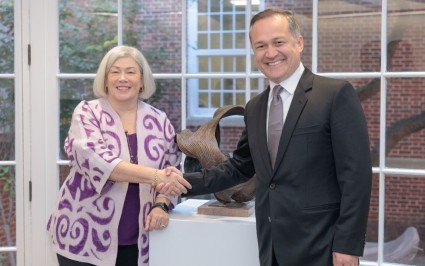Of the many young people whom Cathy Eng has treated for cancer, the person who stood out the most was a young woman with a 65-year-old’s disease. The 16-year-old had flown from China to Texas to receive treatment for a gastrointestinal cancer that typically occurs in older adults. Her parents had sold their house to fund her care, but it was already too late. “She had such advanced disease, there was not much that I could do,” says Eng, now an oncologist at Vanderbilt University Medical Center in Nashville, Tennessee.
Eng specializes in adult cancers. And although the teenager, who she saw about a decade ago, was Eng’s youngest patient, she was hardly the only one to seem too young and healthy for the kind of cancer that she had.
Thousands of miles away, in Mumbai, India, surgeon George Barreto had been noticing the same thing. The observations quickly became personal, he says. Friends and family members were also developing improbable forms of cancer. “And then I made a mistake people should never do,” says Barreto, now at Flinders University in Adelaide, Australia. “I promised them I would get to the bottom of this.”
It took years to make headway on that promise, as oncologists such as Barreto and Eng gathered hard data. Statistics from around the world are now clear: the rates of more than a dozen cancers are increasing among adults under the age of 50. This rise varies from country to country and cancer to cancer, but models based on global data predict that the number of early-onset cancer cases will increase by around 30% between 2019 and 20301. In the United States, colorectal cancer — which typically strikes men in their mid-60s or older — has become the leading cause of cancer death among men under 502. In young women, it has become the second leading cause of cancer death.
As calls mount for better screening, awareness and treatments, investigators are scrambling to explain why rates are increasing. The most likely contributors — such as rising rates of obesity and early-cancer screening — do not fully account for the increase. Some are searching for answers in the gut microbiome or in the genomes of tumours themselves. But many think that the answers are still buried in studies that have tracked the lives and health of children born half a century ago. “If it had been a single smoking gun, our studies would have at least pointed to one factor,” says Sonia Kupfer, a gastroenterologist at the University of Chicago in Illinois. “But it doesn’t seem to be that — it seems to be a combination of many different factors.”
On the increase
In some countries, including the United States, deaths owing to cancer are declining thanks to increased screening, decreasing rates of smoking and new treatment options. Globally, however, cancer is on the rise (see ‘Rising rates’). Early-onset cancers — often defined as those that occur in adults under the age of 50 — still account for only a fraction of the total cases, but the incidence rate has been growing. This rise, coupled with an increase in global population, means that the number of deaths from early-onset cancers has risen by nearly 28% between 1990 and 2019 worldwide. Models also suggest that mortality could climb.
Often, these early-onset cancers affect the digestive system, with some of the sharpest increases in rates of colorectal, pancreatic and stomach cancer. Globally, colorectal cancer is one of the most common cancers and tends to draw the most attention. But others — including breast and prostate cancers — are also on the rise.
In the United States, where data on cancer incidence is particularly rigorous, uterine cancer has increased by 2% each year since the mid-1990s among adults younger than 50. Early-onset breast cancer increased by 3.8% per year between 2016 and 2019.
The rate of cancer among young adults in the United States has increased faster in women than in men, and in Hispanic people faster than in non-Hispanic white people. Colorectal cancer rates in young people are rising faster in American Indian and Alaska Native people than they are in white people (see ‘Health disparities’). And Black people with early onset colorectal cancer are more likely to be diagnosed younger and at a more advanced stage than are white people. “It is likely that social determinants of health are playing a role in early-onset cancer disparities,” says Kupfer. Such determinants include access to healthy foods, lifestyle factors and systemic racism.














